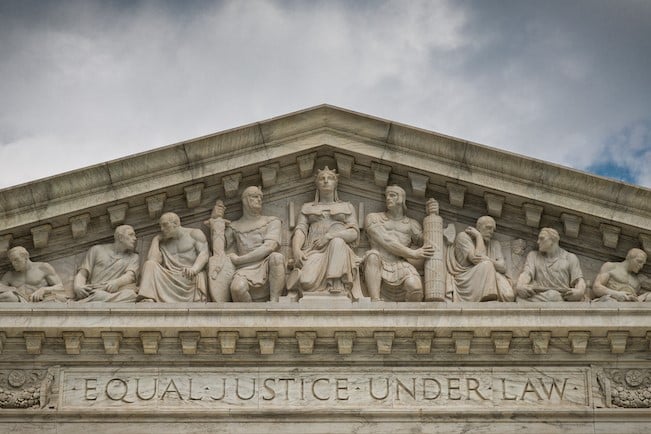Prepare to Make a Difference With a Legal Studies Education
From landlord-tenant disputes to violations of human rights, millions of Americans battle complex legal issues every year. The road to justice is rarely straightforward, though. It takes in-depth knowledge of legal procedures, the U.S. court systems, and civil and criminal law to navigate legal challenges and emerge victoriously.
As a Legal Studies major, you will gain a comprehensive overview of legal concepts, legal terminology, and the many ways in which the law affects nearly every aspect of our lives. Your education will familiarize you with the roles and limitations of our legal institutions. You will also discuss the changing dynamics within the legal profession and explore the intersection between legal aid and public service.
Gain the Insight to Navigate Our Country’s Laws and Legal Systems
A legal studies education arms you with practical, real-world knowledge of American law, legal theory, and the inner workings of our federal and state court systems. Your coursework will help you to better understand civil and criminal legal procedures. Additionally, you will discuss the ethical guidelines that help shape the legal world as you develop core skills in legal research, legal reasoning, and legal writing.
All Related Programs
Develop the Legal Literacy to Help Serve Your Community
Majoring in Legal Studies can help you attain the legal literacy necessary for understanding our state and federal legal institutions. American Judicial System (AJS.org) offers the following definition for legal literacy: “At its core, legal literacy is the ability to understand and make informed decisions about legal matters. It encompasses knowledge of rights and responsibilities under the law, as well as the competency to apply this knowledge in everyday situations.”
Whether your goal is to attend law school or advocate for justice as a non-lawyer professional, a legal studies education equips you with a solid grasp of how our country’s legal system operates.
Join the Growing Movement to Improve Access to Justice
The American Bar Association (ABA) defines “access to justice” as “the ability of citizens to seek and obtain a remedy for a justice problem through formal or informal institutions of justice, and in conformity with human rights standards.”
The Sixth Amendment to the U.S. Constitution grants us the right to a public defender to battle criminal charges in court. There is, however, no equivalent right to free counsel for civil disputes. Yet, lawyer fees cost upwards of $168 per hour; litigation is simply too expensive for low-income – and even many middle-class – Americans. As a result, the Legal Services Corporation reports that millions of individuals struggle every day to navigate civil legal problems pertaining to basic needs, such as:
- Safe housing
- Healthcare
- Child custody
- Protection from abuse
Recognizing the limited access to justice created by unaffordable lawyer fees, a number of states have begun to consider introducing “new tiers of legal professionals,” as the Institute for the Advancement of the American Legal System (IAALS) describes. These tiers include allied legal professionals or ALPs. IAALS defines ALPs as, “licensed and regulated professionals who are not lawyers [and] can represent clients as well as or better than lawyers in the limited matters they handle.”
Discuss Rule of Law and its Influence on the “Access to Justice” Movement
The World Justice Project defines rule of law as, “a durable system of laws, institutions, norms, and community commitment that delivers four universal principles: accountability, just law, open government, and accessible and impartial justice.” As the organization elaborates, “accessible and impartial justice” includes “accessible and affordable” solutions that allow people to resolve legal disputes in a timely manner.
In accordance with this definition, the ABA established the Rule of Law Initiative (ROLI) to help improve access to justice. ABA ROLI programs “work to empower non-traditional legal resources, such as community-based paralegals, that often serve as a primary means by which poor and marginalized people settle disputes.”
As a legal studies major, you will discuss how rule of law and ROLI programs influence legal processes and conflict resolution. In addition, your coursework will introduce you to the growing capabilities of paralegals, legal assistants, and ALPs.
Career Opportunities Awaiting Legal Studies Degree-Holders
An undergraduate degree in legal studies may lay the groundwork for a career as a paralegal or legal assistant, according to the Bureau of Labor Statistics (BLS). Although Legal Studies majors are not technically pre-law students, the bachelor’s degree program in legal studies may also be a practical choice for learners interested in attending law school.
Alternatively, a legal studies education could even help prepare students to pursue roles outside of the legal field. Graduates may seek career opportunities as accountants, auditors, managers, and even education administrators, as the BLS suggests. (Some of these paths may require additional certification or credentials beyond a legal studies degree.)

Consider a Future in Legal Entrepreneurship
As the legal landscape continues to evolve, new entrepreneurial opportunities arise for ALPs and paralegals. Undergraduate students interested in starting their own businesses may particularly connect with the Legal Entrepreneurism degree concentration offered through American Military University’s Legal Studies bachelor’s degree program.
Coursework examines the fundamentals of starting a business and students discuss key concepts that include:
- Business ethics
- Business law
- Contracts law
- Constitutional law
- Employment law
- Forming a business plan
- Idea generation
- Intellectual property law
- Networking
Independent paralegals and ALPs may provide services to private attorneys, law firms, and, where permitted, clients themselves. As both a business owner and a legal professional, you will have the freedom to build your own company from the ground up and advocate to improve access to justice.
Become a Proponent for Social Justice
A career in the legal profession represents an opportunity to bring about meaningful change within your community. Whether you pursue a future as an attorney or a non-lawyer professional – such as a paralegal, legal assistant, or ALP – you will be in the unique position to serve those who cannot serve themselves.
Traditionally, Americans have had two routes to affordable legal representation for civil disputes: pro bono counsel and law school legal clinics. The term “pro bono” comes from a Latin phrase that means, “for the public good,” according to Merriam-Webster. Pro bono counsel refers to lawyers and law firms providing free legal services. While this is an admirable practice, unfortunately, there are simply too many civil cases for pro bono lawyers to assist with.
The same can be said of legal clinics, through which law school students may provide pro bono legal counsel to clients. In 2021 alone, 74% of low-income households reported having one or more civil legal issues, according to the Legal Services Corporation (LSC).
Given that the LSC estimates low-income households represent roughly 50 million Americans during this timeframe, this means approximately 37 million people encountered legal troubles within a single year. This figure does not even include middle-class Americans who find themselves unable to afford legal fees. Nevertheless, ABA-approved law schools account for just 197 institutions – hardly enough to accommodate millions of cases every year.
Acquire the Knowledge and Skills to Serve Those Unable to Serve Themselves
Over 70% of civil and family cases include at least one Pro Se (self-represented) party, as reported by the IAALS. The IAALS also states, “Judges confirm that the inability to effectively present their case from an evidentiary standpoint works against self-represented litigants.” Arguably, then, there are no advantages to a Pro Se approach. Nonetheless, Americans continue representing themselves in court, due to their inabilities to afford professional legal services.

What Is Business Law and How Does It Affect Companies?
In this article, Professor James Barney reviews the robust field of business law.

What Undergraduate Degree Is Best for Law School Students?
The article explores the value of diverse academic backgrounds and the importance of developing essential skills like critical thinking and communication for aspiring law students.

Inequality in the Criminal Justice System and Accountability

Additional Resources
Frequently Asked Questions About the Legal Studies Major
The Legal Studies major encompasses an overview of U.S. law, legal concepts, and the legal system itself. Undergraduate students pursuing their associate or bachelor’s degree explore many of the key roles and responsibilities of paralegal professionals, including how to properly conduct legal research and prepare legal documents. Bachelor’s students may also have the chance to specialize their studies with a concentration. The master's-level Legal Studies program further expands upon the information discussed in undergraduate legal studies courses. In addition, master’s-level students deepen their knowledge of various aspects of U.S. law, including:
- contract law
- criminal law
- employment law
- immigration law
- international law
- property law
- tort law
Legal Studies students can also expect to examine topics including criminal justice, public policy, American history, American politics, and political science from the perspective of the legal community.
Unlike other majors, the Legal Studies discipline provides students with knowledge applicable to a broad range of public- and private-sector fields. This includes everything from homeland security to business, and, of course, law. The knowledge and skills students acquire throughout a legal studies program may, therefore, apply to any number of professional endeavors.
Legal Studies students explore the relationships between various fields of law and our state and federal legal systems here in the U.S. Major requirements focus students’ attention on key issues that include legal ethics, access to justice, criminal law, and litigation.
Law degrees, such as a Juris Doctor (JD) or a Master of Laws (LLM), are professional degrees suited for individuals interested in practicing law. Alternatively, Legal Studies degree programs provide students the opportunity to study U.S. law and legal systems without necessarily preparing to become licensed attorneys. You do not need to attend law school to pursue a legal studies degree.
Legal Studies may be a suitable major for undergraduate students who aspire to practice law, as this discipline provides a well-rounded overview of U.S. laws and legal systems. At the same time, the American Bar Association (ABA) states, “The ABA does not recommend any undergraduate majors or group of courses to prepare for a legal education. Students are admitted to law school from almost every academic discipline.”





